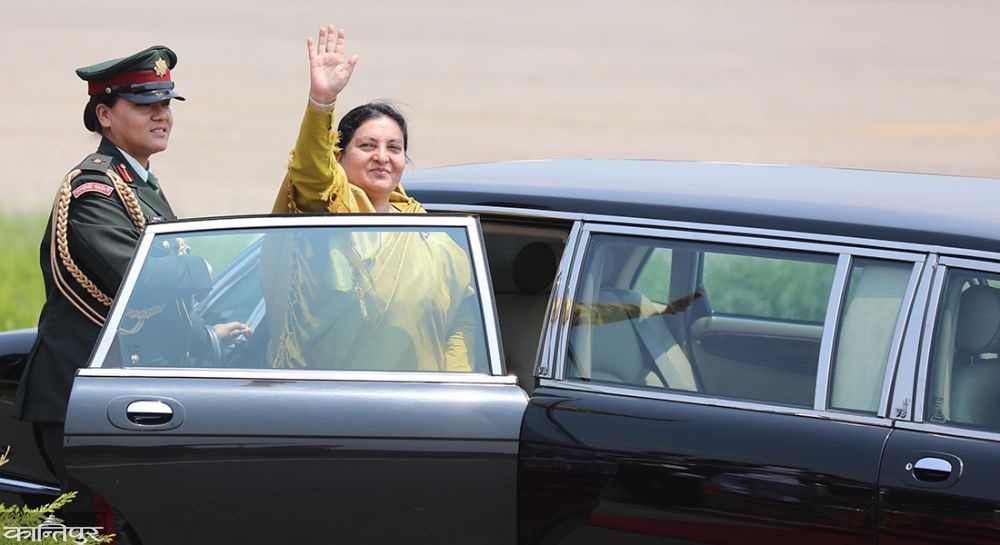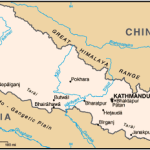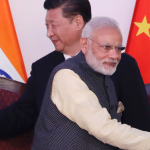At the invitation of Chinese President Xi Jinping, the Presidents of Nepal, Chile, Mongolia, Portugal and Switzerland will pay state visits to China to attend the second Belt and Road Forum from International Cooperation (BRF). Compared to the other state leaders, the Nepali President Bidhya Devi Bhandari probably has got more on her plate than the others in which she has to consider as to how she is going to lead her country.
Her visit is planned from April 24 to May 2 which is a slightly extended period than the other state leaders. During this period, the president will hold bilateral delegation-level talks with her counterpart Chinese President Xi which will be followed by a signing ceremony – also she will attend the opening ceremony of the 2019 Beijing International Horticultural Exhibition.
China attaches great importance to its relations with Nepal due to the sharing of the border along with Tibet which is considered its ‘window of vulnerability’ – therefore, the state level visit is already a success for China as it shows the continuation with the confirmation of Nepal on ‘One China’ policy. However, as to how much president Bhandari can capitalise the visit to strengthen Nepal’s conduct of pragmatic foreign policy is yet to be seen.
Since the overthrow of King, The Federal Democratic Republic of Nepal has already seen 11 Prime Ministers– but, only 3 Head of the State. Except for the former de facto Prime Minister Khil Raj Regmi from the Independent party between 2013 and 14, the rest of the Prime Ministers were either from the Communist party or the Nepali Congress party– these are the two major political parties in Nepal. Three PMs were from the Nepali Congress whereas seven were from the Communist. Amongst them, only two from the communist party had the opportunity to discuss with the Chinese president Xi Jinping properly.
However, none from the Congress has made an attempt nor have they met yet. It is one of the clear signs that show how much our leaders give more priority to the politics of ideology in its conduct of foreign policy which means putting lesser importance on pragmatism. Therefore, Nepal’s relation with its neighbours is not stable as it has the habit of tilting from one to another depending on which political party governs the government. Significant projects to either neighbours are awarded accordingly.
Take an example of Budhi Gandaki hydropower project which was initially awarded to the Chinese State-Owned Company (SEO) China Genzhouba Group Corporation (CGGC) by the communist leader Prachanda in May 2017. However, after Deuwa from Congress formed a government, the $2.5 billion power project was cancelled in November 2017 within 6 months after taking the office -which not surprisingly, had been restored in September 2018 by the Oli led communist government.
It is a grim reality of the Nepalese political parties who seek party interests more than that of the country. Ideology instigates with greater importance than pragmatism for the political party in the government when conducting foreign policy. For the Nepalese political leaders, the individual interests are above the party, so does the party’s interests lie above the state. Nepalese political leaders have a long history of aligning its party ideology with foreign policy practice; therefore, how they deal with its neighbours is often dictated by this approach.
Budhi Gandaki hydropower project is one of the example signed under communist leaders, Prachanda and Oli– similarly, two controversial treaties, the Tanakpur treaty of 1991 under the Congress leader Koirala and Mahakali treaty of 1996, again under the Congress leader Deuwa tells the similar approach.
Out of this party politics, now we have the president’s state visit to China. Although the previous Nepalese president Ram Baran Yadav has already visited China -briefly meeting the Chinese president Xi at the Boao Forum for Asia Annual Conference in March 2015 – but, the state visit of the president Bhandari carries more considerable significance.
Since she is neutral amongst the political parties, she is expected to lead the country for the interest of the country but not for the political parties.Unlike the meeting of Prachanda and Oli with Xi, we can perhaps expect something more and different from this visit. By collectively representing the interests of both parties, the president should capitalise her visit for the interests of the state in which the previous political leaders have failed to apply effectively.





Leave a Reply